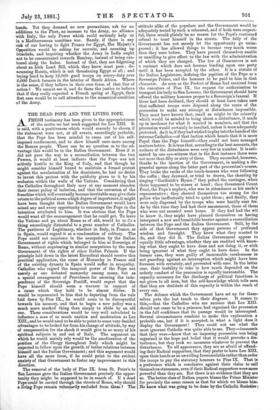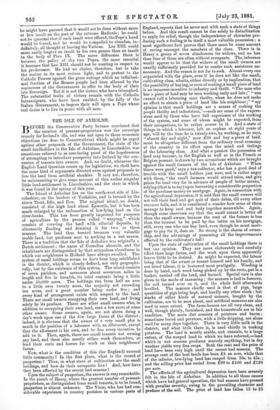THE DEAD POPE AND THE LIVING POPE.
AFRESH testimony has been given to the appropriateness of the motto we last week suggested for Leo XIII. It is said, with a positiveness which would scarcely be shown if the statement were not, at all events, exceedingly probable, that the Pope has been minded to come out of his self- imposed confinement, and to show himself once more among the Roman people. There can be no question as to the ad- vantage this would be to the Italian Government. Even if it did not pave the way to a reconciliation between the two Powers, it would at least indicate that the Pope was not actively hostile to the King of Italy, and that though he might consider himself bound to maintain a formal protest against the secularisation of his dominions, he had no desire to invest this protest with the publicity given to it by his seclusion within the walls of the Vatican. Considering that the Catholics throughout Italy may at any moment abandon their recent policy of isolation and that the extension of the franchise which will eventually become inevitable may give their return to the political arena a high degree of importance, it might have been thought that the Italian Government would have seized any and every opportunity to encourage the Pope in the intention attributed to him. It was obvious that the Pope would want all the encouragement that he could get. To leave the Vatican and go about Rome as of old, would be to ao a thing exceedingly distasteful to a great number of Catholics. The partisans of Legitimacy, whether in Italy, in France, or in Spain would regard it as a condonation of robbery. The Pope coill not acquiesce in the usurpation by the Italian Government of rights which belonged to him as Sovereign of Rome, without acquiescing in similar usurpations by the same Government of the rights of other Italian Princes. If the principle laid down in the latest Encyclical should receive this practical application, the came of Monarchy in France and of the existing dynasty in Spain would suffer in sympathy. Catholics who regard the temporal power of the Pope not merely as one defeated monarchy among many, but as a special arrangement of Providence for securing the inde- pendence of the Sovereign Pontiff, would regret that the Pope himself should seem a waverer in support of a cause which they hold to be almost divine. It would be represented to him that in departing from the rule laid down by Pius IX., he would seem to be disrespectful towards his memory, and that to begin a new policy was a much more marked thing than simply to abide by an old one. These considerations would be very well calculated to influence a man of so much caution and moderation as Leo MIL, and he would need to be able to point to some very decided advantages to be looked for from his change of attitude, by way of compensation for the shock it would give to so many of his spiritual subjects in and out of Italy. The argument on which he would mainly rely would be the amelioration of the position of the Clergy throughout Italy which might be expected to follow upon the growth of better relations between himself and the Italian Government; and this argument would have all the more force, if he could point to the evident anxiety of that Government to foster, any improvement in this direction.
The removal of the body of Pius IX. from St. Peter's to San Lorenzo gave the Italian Government precisely the oppor- tunity they might be supposed to be in search of. If a dead Pope could be carried through the streets of Rome, why should a living Pope remain volunarily excluded from them The
attitude alike of the populace and the Government would be adequately tested by such a rehearsal, and if both were respect- ful, there would plainly be no reason for the Pope's continued refusal to trust himself in the streets. The folly of the Government has not merely let the opportunity go unim- proved; it has allowed things to become very much worse than they were before. They have proved themselves unable or unwilling to give effect to the law with the administration of which they are charged. The law of Guarantees is not a contract which does not become binding upon one party until it has been accepted by the other. It is a statute of the Italian Legislature, defining the pqsition of the Pope as a Sovereign Prince, and the honours to be paid to him in that character. As soon as the Prefect of Rome had received from the executors of Pius IX. the request for authorisation to transport his body to San Lorenzo, the Government should have offered the military honours proper to a Sovereign's funeral. If these had been declined, they should at least have taken care that sufficient troops were disposed along the route of the procession to make any attempt at disturbance impossible. They must have known that, small as might be the minority which would be minded to bring about a disturbance, it made up in insolence for what it wanted in numbers, and that the procession would certainly be insulted, unless it were adequately protected. As it is, if they had wished to play into the hands of the extreme Catholics—of that faction which boasts that it is more Papal than the Pope himself—they could not have managed matters better. It is true that, according to the best accounts, the authors of the disturbance were very few in number. It is esti- mated by one eye-witness that in the first instance there were not more than fifty or sixty of them. They succeeded, however, thanks to the inaction of the Government, in making a dis- graceful uproar along the latter part of the procession's course. They broke the ranks of the torch-bearers who were following the coffin ; they drowned, or tried to drown, the chanting by singing " Garibaldi's Hymn ;" they pelted the carriages, when there happened to be stones at hand ; they threatened Count Pecci, the Pope's nephew, who was in attendance as his uncle's representative ; they showed themselves too strong for the police who ineffectually tried to quiet them ; and finally, they were only dispersed by the troops who were hastily sent for. As by this time they had had their amusement, those of them who were not arrested went home. If they had had the wit to know it, they might have plumed themselves on having interposed a new and formidable barrier against a reconciliation between the Pope and the Italian Government. Still, by the side of that Government they appear persons of profound wisdom and foresight. They knew what they wanted to do, and they did it. The Italian Government appear to equally little advantage, whether they are credited with know- ing what they ought to have done and not doing it, or with being ignorant of what they ought to have done. In the former case, they were guilty of inexcusable carelessness in not guarding against an interruption which might have been foreseen with certainty, and prevented with ease. In the latter case, their inability to take in how much depended on the orderly conduct of the procession is equally inexcusable. The capacity necessary for the discharge of political functions is not given to all men, but the self-knowledge which tells men that they are destitute of this capacity is within the reach of every one.
The defence which the Government have set up for them- selves puts the last touch to their disgrace. It comes to this,—that the Catholics who are anxious that Leo XIII. should not cease to be a prisoner, had organised the procession in the full confidence that its passage would be interrupted. Several circumstances combine to make this explanation a probable one, but if it is accepted, in what a light does it display the Government ! They could not see what the most ignorant Catholic was quite able to see. They—innocents. that they were—knew that an imposing procession was being organised in the hope and belief that it would provoke a dis- turbance, but they took no measures whatever to prevent the disturbance. To all appearance, they are so afraid of offend- ing their Radical supporters, that they prefer to have Leo XIII. upon their hands as an unwilling Irreconcilable rather than order the troops to pay the statutory honours to Pius IX. That is a preference which is conclusive against their claim to call themselves statesmen, even if their Radical supporters were more powerful than they are. But there is no evidence that they are so. The better class of Italian papers blame the Prime Minister for precisely the same reason as that for which we blame him. He knew what was going to be done by the Catholic Societies ; he might have guessed that it would not be done without more or less insult on the part of the extreme Radicals ; he could not be ignorant that if such insult were offered, the Pope's hand would be forced, and he would be compelled to abandon, in- definitely, all thought of leaving the Vatican. Leo XIIL could more easily forgive an insult to his own person than an insult to the body of Pius IX. The more difference there is between the policy of the two Popes, the more essential it becomes that Leo XIII. should not be wanting in respeet to his predecessor. He had no choice, therefore, but to take the matter in its most serious light, and to protest to the Catholic Powers against the gross outrage which an infinitesi- mal fraction of the Roman people had been allowed by the supineness of the Government to offer to the body of their late Sovereign. But it is not the rioters who have triumphed. The substantial fruits of victory remain with the Catholic Intransigents, who have been enabled, by the folly of the Italian Government, to impose their will upon a Pope whose real desire is to live in peace with all men.



































 Previous page
Previous page